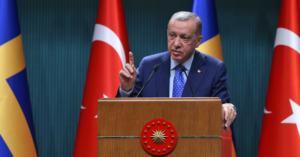Everyone in Turkey, in its region and in countries with interests or concerns about Turkey’s political future, probably agree that presidential and parliamentary elections this spring will be the most important for every nation involved. To maximize the opportunity for the Turkish public to come to the polls, after calculating external factors such as Muslim Hajj pilgrimage, a religious holiday and university entrance exams, President Recep Tayyip Erdoğan brought forward the election date from an originally scheduled June 18 to May 14.
In its January 20 edition, The Economist put Turkey’s elections on its cover page, with the headline, “Turkey’s looming dictatorship.” The magazine commented: “The longer Mr Erdoğan has been in power, the more autocratic he has grown.” The Economist also reminded readers that “Erdogan once likened democracy to a tram journey: when you reach your destination, you get off.” It concluded: “Mr Erdoğan’s behavior as the election approaches could push what is today a deeply flawed democracy over the edge into a full-blown dictatorship.”
Erdoğan’s treatment — through a judiciary totally under his control — of one of his potential rivals, Istanbul’s Mayor Ekrem İmamoğlu, who defeated Erdogan’s party in 2019, is revealing. A court sentenced the popular İmamoğlu to a two-year prison sentence and a ban from politics for calling election officials who had annulled his first election “idiots.” (Imamoğlu won twice.) If his conviction is not annulled or overturned, that verdict may take the Imamoğlu out of the presidential race.
US asked Israel for its Hawk missiles to send to Ukraine
Imamoğlu’s court verdict was not surprising. Erdoğan has made it a habit to use the courts in the way he thinks would best suit his political agenda. As of 2020, the number of Kurdish mayors in prison was 21. The Erdoğan administration had appointed its own administrators to 45 of a total of 65 municipalities won by the pro-Kurdish party, Peoples’ Democratic Party (HDP), in 2019.
Read more: Gatestone Institute
Ask me anything
Explore related questions





